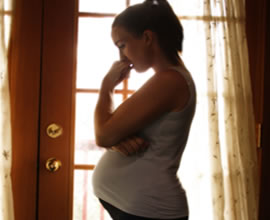Chances of a miscarriage in a pregnancy
Miscarriages happen in about one in eight confirmed pregnancies
Its believed to be about one in four of all pregnancies, where miscarriages can occur at a very early stage and are mistaken for a period.
The chances of having a miscarriage increase as you get older, or if you have had a miscarriage before.
Three quarters of miscarriages occur in the first trimester. If you have a miscarriage after the thirteenth week it is called a late miscarriage.
Miscarriage Symptoms
The most common miscarriage symptom is bleeding from the vagina. Vaginal bleeding happens to about a quarter of pregnant women, with most continuing on to have a normal healthy pregnancy. However, if you do experience some vaginal bleeding you should contact your Doctor or Obstetrician immediately.
You will be asked to describe how long you have been bleeding, the colour, and the quantity of bleeding. A light spot of blood may not be a need for concern, however a heavy flow of blood could mean that you will need to go straight to the hospital.
Don’t use a tampon to stem the bleeding during pregnancy and you may want to keep the pad you do use until you have spoken to your Doctor or Obstetrician. I know it sounds horrible, but any clots and tissue from a miscarriage if kept in a clear plastic container or bag can be examined by the Doctor and could help to find the cause of the miscarriage.
Causes of miscarriages
- Nature rejecting a problem pregnancy – which could be a fetal abnormality, problems with the uterus, placenta, cervix, sperm, immune system, any number of possible causes.
- An “Incompetent Cervix” can be the cause of one in four miscarriages in the second trimester (week 14 up to week 26). An “incompetent cervix” means that sometimes the cervix opens too soon. Previous gynecological surgery, abortions or miscarriages can increase your risk of this condition. Treatment can involve stitching the cervix closed during the pregnancy until the baby is ready to come out.
If you have a Miscarriage
- Having a miscarriage is very distressing and it is important that you allow yourself the time and space to mourn your loss and to talk it over with your partner. As well as being very distressing for you and your partner, it can also be a cause of friction between you both if you have different ways of dealing with your loss.
- Some people find it useful to talk to a support group – your local hospital or your Doctor should be able to put you in contact with one.
- After the miscarriage, get all the information you can from your obstetrician about possible risk factors and treatments for future pregnancies and get all your questions are answered.
You should consult your Doctor if you are worried that you have a greater risk of miscarriage or have some unanswered questions about miscarriage.
